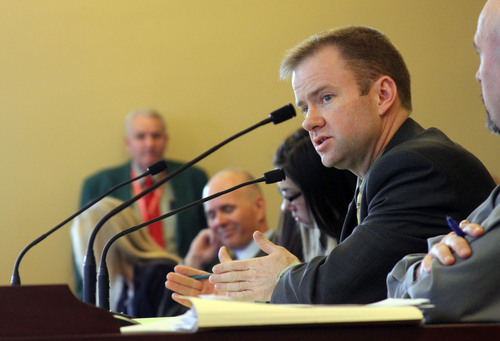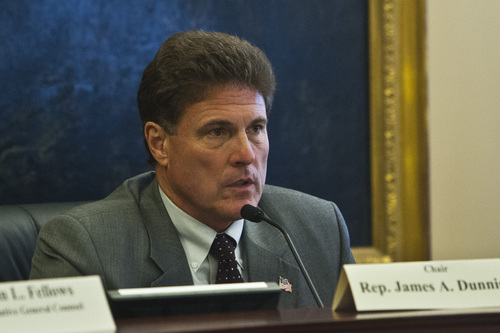This is an archived article that was published on sltrib.com in 2014, and information in the article may be outdated. It is provided only for personal research purposes and may not be reprinted.
An alternative to expanding Medicaid backed by House Republicans debuted in committee Monday to a largely receptive audience.
The plan addresses the so-called "Medicaid coverage gap" existing in states that choose not to expand Medicaid: in Utah, 54,000 poor adults who don't qualify for subsidies to put toward the purchase of private coverage on the federal marketplace, http://www.HealthCare.gov.
It was tacked onto HB141, a catch-all bill for regulatory changes Utah must make to comply with the Affordable Care Act (ACA), and approved by the House Business and Labor committee by an 11-3 vote along party lines.
Democrats oppose the plan and Utah's Republican Gov. Gary Herbert has called it "irresponsible" because it costs more and would offer leaner coverage to fewer people than options put forward earlier in the year by a legislative task force that studied the matter for more than a year.
Some House Republicans voiced similar concerns on Monday but supported the measure to allow debate by the full House.
The plan, dubbed "Access Utah" would forgo $500 to $600 million in federal funding annually, instead spending an unknown amount of state money to subsidize commercial insurance for some Utahns in the coverage gap.
The "medically frail" and parents with dependent children would be first in line for the subsidies, which some could use to enroll in their workplace benefits, explained sponsoring Rep. Jim Dunnigan, R-Taylorsville, an insurance executive.
Any money left over would be given to others in the coverage gap, he said.
HB141 has no fiscal note; the bill's price tag depends on how much lawmakers see fit to appropriate in the final budget, Dunnigan said.
And that spending will determine, in part, how many people are covered, he said. "It might cover part of the coverage gap, it might cover all of the coverage gap."
The plan is meant as a temporary stopgap to last two years, at which point a federal "super waiver" will give states more flexibility to innovate, Dunnigan said.
Rep. Larry Wiley, D-West Valley City worries it will merely "create a doughnut hole within a doughnut hole" and "throws away" Utahns' hard-earned federal income tax dollars.
"We can wait and opt [into the Medicaid expansion later] but we can also opt out at any time," he said.
And Rep. Johnny Anderson, R-Taylorsville, questioned the House Plan's financing.
Even if the Legislature spends $40 million — more than the $35 million projected for an earlier draft of the plan — that amounts to $750 per each of the 54,000 in the coverage gap, Anderson noted.
"I don't think we're going to help everyone in the doughnut hole with that."
But Rep. Jacob Anderegg, R-Lehi, called it a "great Utah solution" to cover the neediest without completely neglecting young, healthy Ph.D. students whose medical needs amount to "getting the sniffles."
"I would rather we not expand, period rather than head down the path of socialized medicine," he said.
The House plan was created after House Speaker Beck Lockhart said she would reject any expansion scenario that draws on federal funds.
But it, too, uses two federally-funded programs as the conduit for health coverage: Utah's Premium Partnership and the Primary Care Network, which have their own strings and limits.
Low-income advocates and Utah hospitals favor an option embraced by other conservative states that entails using federal, public Medicaid dollars to buy private coverage.
But the Utah Hospital Association is neutral on HB141.
""This is the first time in 49 years since the Medicaid program began that we're having a serious discussion about covering the doughnut hole," said the group's lobbyist Dave Gessell, confident lawmakers will find a fix.
"This is probably the most important health policy decision this Legislature will make in a generation."
Twitter: @KStewart4Trib





